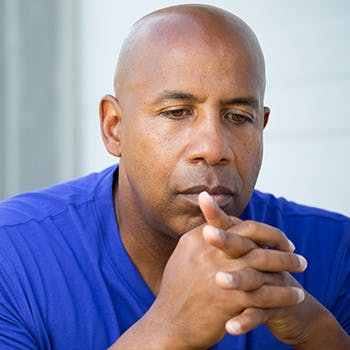How long do hemorrhoids last?

Almost everyone will suffer from hemorrhoids at some point in their life. They are enlarged or swollen veins at the bottom of the rectum or anus that are typically caused by increased pressure in the pelvic or rectal area.1 This pressure may be the result of pregnancy, obesity, prolonged sitting, or excessive straining when using the bathroom.1
Those who suffer from this common condition may find themselves wondering how long hemorrhoids last. We have some answers, as well as helpful tips for managing the symptoms at home.
What are the different types of hemorrhoids?
There are two different types of hemorrhoids: internal and external. External hemorrhoids are visible on the outside of the anus and can become inflamed. Occasionally the blood inside the swollen vein can clot and harden, which can result in severe pain.2 Internal hemorrhoids originate higher in the anal canal and are frequently the cause of bleeding after a bowel movement. If an internal hemorrhoid becomes large and severe, it may push out through the anus and may become trapped outside the body, causing a lot of pain.1
Unfortunately, for those wondering how long hemorrhoids last, there is no set timeline for when they clear up. Most of the time, symptoms go away after a few days, even without treatment.1 However, if symptoms do not improve after a week of home care, you should speak with your doctor.2
If you’ve been asking yourself, “How long do internal hemorrhoids last,” the answer depends entirely on the severity of the hemorrhoid. A Grade 1 hemorrhoid is considered minor but Grade 2, 3, and 4 hemorrhoids protrude outside the body and may require medical attention. These are the different grades of hemorrhoids:
- Grade 1 = Hemorrhoids that are visible but don’t prolapse.
- Grade 2 = These are hemorrhoids that do prolapse during the Valsalva maneuver, but then will naturally reduce. The Valsalva maneuver refers to when you are doing exercise routines (like weightlifting and other gym-based exercises) and you hold your breath while you push to exhale, which can make hemorrhoid pain worse.
- Grade 3 = Hemorrhoids that will prolapse during the Valsalva maneuver, but require a manual reduction.
- Grade 4 = Hemorrhoids that are not reducible and will require medical attention.5
In these cases where over-the-counter treatments are ineffective, doctors may address an internal hemorrhoid that had prolapsed, or moved outside the body, with medical procedures. One such procedure for shortening internal hemorrhoid duration is referred to as rubber band ligation, which an elastic band is placed around the base of a hemorrhoid. This causes the enlarged vein to shrink and the procedure is completed after a series of two to four procedures, done six to eight weeks apart.3 If internal hemorrhoids have progressed to the point that surgery is required, a hemorrhoidectomy may be required to remove the offending vein and tissue. Recovery usually lasts 7-10 days.3
External hemorrhoids that have thrombosed, or clotted and become hard, can be very painful. Without medical help, the pain will typically improve over two to three days.4
How can you minimize hemorrhoids?
Most hemorrhoids do not require medical attention and can be managed at home either through over the counter drugs or lifestyle changes:
- Eat a diet that’s high in fiber.
- Exercise more.
- Adopt healthy bathroom habits.
- Learn how to treat flare ups.
- Use topical relief. Find out which product is best for you.
- Stay hydrated to keep your stool soft.2
- Avoid long periods of sitting, if you can help it.2
- Use the restroom as soon as you feel the urge.3
- Try a sitz bath to relieve itching and irritation.3
Living with hemorrhoids
By age 50, about half the population has experienced a hemorrhoid, or a symptom of one.3 So, you're not alone! While there is no specific timeline for how long a hemorrhoid lasts, most people find relief from symptoms in a few days. In instances where pain persists for more than a week, consult your physician.



